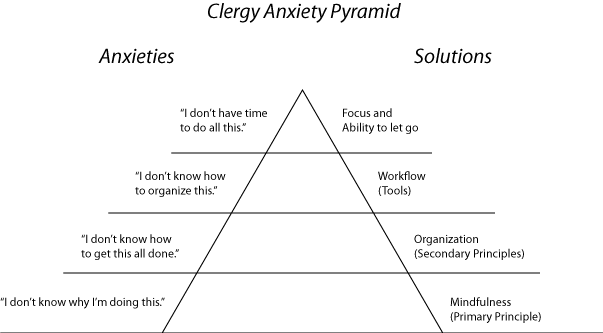The Topic
|
Why do we get anxious as clergy people?
Let's get rid of the interpersonal stuff with the church ladies, this year's budget and attendance figures, the call from the Bishop's office yesterday and the nagging feeling that you have not adequately prepared for a Zombie Holocaust. In studies, clergy people have been found to have paradoxically both a high level of job satisfaction and a high level of job anxiety when compared to the regular population. We love what we do. But because of the entreprenurial nature of church work, the limited resources we have, and a parishoner base that never really sees all the work we do, it feels like there's always more to do that we can ever accomplish. This causes a certain level of anxiety. It's inherent in the job. |
"Therefore, stop worrying about tomorrow, because tomorrow will worry about itself. Each day has enough trouble of its own. " - Matthew 6:34
|
If we are not careful, it is easy to quickly escalate our anxiety from a manageable level to an overwhelming level. The illustration above shows common levels of anxiety related to clergy workflow. Clergy often complain that they don't have time to get everything done. As noted above, this is almost always true. But is it really because we can't get everything done, or because we can't seem to get anythingdone? There's a big difference. The anxiety you take home after a great day of work is very different than the anxiety you take home when you've spent the whole day spinning in place. The anxiety of not having enough actual time to get everything done is at the top of the pyramid, because it is actually the least anxiety-producing. But let's go down to the base of the pryamid and the worst source of clergy anxiety.The worst kind of anxiety is generated when we forget to be mindful. This is when we forget that our primary role is as a person of presence rather than an ecclesiastical production worker. For the past several decades, it has been in vogue to think of pastors as helping professionals like doctors or therapists. But that is to set aside our primary role, which is not to dosomething, but to be a symbol of God with and for the people of God. To stand In persona Christi. Yes, we share aspects of the helping professions, and yes we do produce things for the church, but it is not the essence of who we are. We forget this at our own peril. Any clergy workflow that leaves out mindfulness is bound to add anxiety, as it will continue to emphasize secondary aspects of our calling over the primary.
Once we move past the issue of mindfulness, we enter into a lesser anxiety-generating realm - that of dealing with all the messages, e-mails, phone calls and papers that cross our desks, many of which have important relational components. In our line of work, some of it is time-critical, but a lot is not. This is where we need organizational principles and a set of tools to implement a workflow, because if we don't have them, it is very likely that the important items that are not time-critical will get completely lost. Clergy are always running behind. It is one thing to be running behind but know where you are in your workflow. it is a completely different thing to be running behind and have no idea where you should go next, hopping from one emergency to another as things become overdue. This is where the anxiety really starts to sink in its teeth, we lose mindfulness, and we surrender our true vocation.
Anxiety can lead to the opposite of mindfulness , which is busyness . When we are in the throes of busyness , we spend a lot of time "working," often without actually getting anything done. It becomes a kind of avoidance that pulls us away from our vocations, the actual work we need to get done, and finally from our family and friends. The progression in a clergy person's journey from wellness to unhealth is anxiety - busyness- burnout.
No workflow can remove all the anxiety from our work, but it can make it manageable, so that we can mentally leave the office when we go home at night. A less anxious pastor is one who is more present to God, his/her flock and family. A less anxiety-filled ministry is a more sustainable one.
Once we move past the issue of mindfulness, we enter into a lesser anxiety-generating realm - that of dealing with all the messages, e-mails, phone calls and papers that cross our desks, many of which have important relational components. In our line of work, some of it is time-critical, but a lot is not. This is where we need organizational principles and a set of tools to implement a workflow, because if we don't have them, it is very likely that the important items that are not time-critical will get completely lost. Clergy are always running behind. It is one thing to be running behind but know where you are in your workflow. it is a completely different thing to be running behind and have no idea where you should go next, hopping from one emergency to another as things become overdue. This is where the anxiety really starts to sink in its teeth, we lose mindfulness, and we surrender our true vocation.
Anxiety can lead to the opposite of mindfulness , which is busyness . When we are in the throes of busyness , we spend a lot of time "working," often without actually getting anything done. It becomes a kind of avoidance that pulls us away from our vocations, the actual work we need to get done, and finally from our family and friends. The progression in a clergy person's journey from wellness to unhealth is anxiety - busyness- burnout.
No workflow can remove all the anxiety from our work, but it can make it manageable, so that we can mentally leave the office when we go home at night. A less anxious pastor is one who is more present to God, his/her flock and family. A less anxiety-filled ministry is a more sustainable one.



